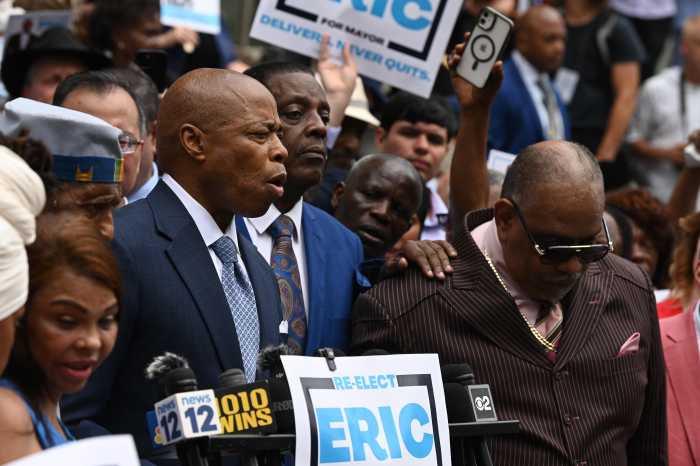The Soldiers Project
It is estimated that 1 million of the about 2.5 million U.S. troops who served in Iraq and Afghanistan are in college right now. On Long Island, a group of about 80 volunteer clinicians is helping veterans and their teachers adjust to their presence via The Soldiers Project’s Adopt-a-College program.
The Soldiers Project is a North Hollywood, CA-based nonprofit that provides free counseling to military veterans who have served after Sept. 11, 2001, and their families. Linda Caginalp of Manhasset, the project’s chair of outreach for L.I., said there are about 2,500 veterans who are college students in Nassau and Suffolk. The L.I. chapter for the past two years has begun relationships with faculty and students at Nassau and Suffolk Community Colleges, LIU Post, Farmingdale State College, Briarcliff College and Touro College. The chapter has reached out to veterans for counseling, regardless of their discharge status, since 2008.
“We want to help the faculty to understand that veterans have had a very different life experience,” Caginalp, a retired businesswoman, said. “It’s a partnership to help keep vets in school and give them a better chance of academic success…and to raise awareness that we are here to help them.”
L.I. chapter co-founder and counselor Susan R. Cohen said. “We want to educate the educators as to why these are special needs students. Twenty-two vets commit suicide every day, which is why we’re driven to serve…Instructors are not informed beforehand that there are vets in their classrooms. They’re invisible and it’s important to help facilitate the school community to be helpful to vets. ”
Edward Paley, a clinical social worker from East Meadow, said about teachers. “We make them aware of the fact that a veteran is different from the average college student. Some of them have seen combat; some of them sit in the back of the class as a way of protecting themselves. Some have to miss a test because they have an appointment at the VA [Medical Center in Northport]. We want to sensitize the faculty to the fact that they’re not just the average college student trying to get out of something…Anxiety, sleep problems, PTSD, depression…are common to vets.”
“Certainly, some of them have nightmares,” Caginalp said, “especially if they’ve been in combat, which means they’re not sleeping well. So they could have hair-trigger anger issues and could be sleep-deprived. They might arrive late, leave early. They sleep in class. They may have children and they’re working jobs –they have a lot of other pressures. Some of them self-medicate because of these issues.”
On the plus side, counselors say, veterans tend to be mature and serious as students. “Certainly the skills they learn in the military are invaluable,” Caginalp said. “Leadership skills…the confidence they show is pretty amazing”
Veterans and their families can contact a Soldiers Project counselor by calling 516-284-7531 and leaving a message. The national group’s website is www.thesoldiersproject.org. All of the L.I. chapter’s counselors are licensed and sessions take place in their offices. Counselors undergo a screening process and must attend at least three seminars. The L.I. chapter meets at the Unitarian Universalist Congregation at Shelter Rock at 45 Shelter Rock Rd. in Manhasset and at various Suffolk locations. It accepts donations, is eligible to receive grants and six months ago hired its first part-time staff person, former Army staff sergeant Charlie Taylor, 32, of Babylon, who did two tours in Afghanistan with the 82nd Airborne Div. and got his master’s degree in social work in May from LIU Post.
Taylor said veterans in college can be “hyper vigilant in a school setting. Anytime anybody squeaks, moves or a cellphone rings, it could distract them.” He said of veterans who are college students, 70 percent drop out or don’t complete their education. Taylor said he also works in the Joseph P. Dwyer Veterans Peer Support Project, and “the tendency to self-isolate is horrendous…There’s a sense of isolation and a lack of job security. Ninety-nine out of a hundred [vets] are either unemployed or underemployed. There’s a sense of hopelessness.”
Unlike with the VA, Soldiers Project sessions are confidential and do not leave a paper trail. “We get referrals from the VA,” Caginalp said. “Some of the vets feel they do not want a diagnosis and a label by the VA in a computer that will follow them forever…And we’ll also see families, children, without the vet being involved.” Taylor said of the confidentiality,
“That’s very important. A lot of guys want to go into the police force or fire department and if you have a diagnosis of PTSD, you can cancel those plans.”
—Jim Smith, 66, of Williston Park, is a Vietnam War veteran. He retired Dec. 31, 2014 after being a Newsday reporter and editor since 1966.

































